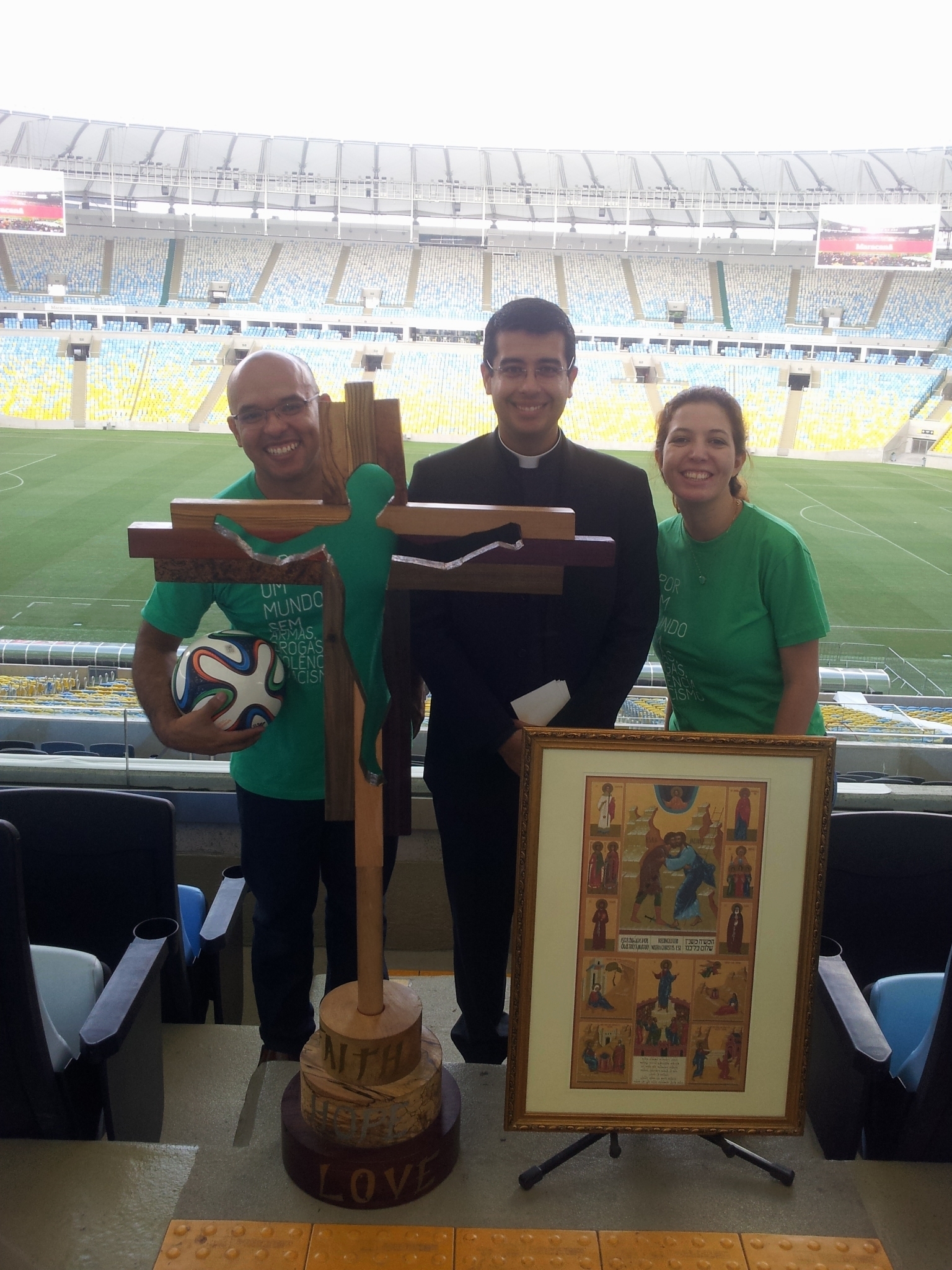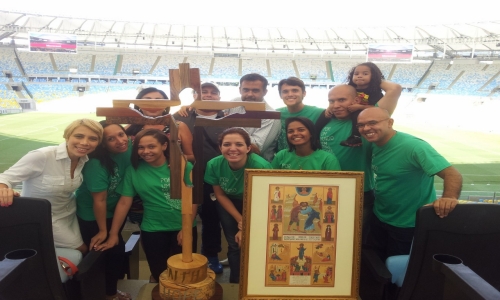The Catholic Church and the Olympics have been closely connected since the creation of the modern Olympic Games, not only through the particular relationship between their founder, Baron Pierre de Coubertin, and Pope St. Pius X at the start of the 20th century, but also because the Pope was well aware of the social and formative benefits of sports in society, and in particular to the younger generations.
Since then, Popes have tried to strengthen relations with the world of sport, knowing that Olympic values recall the teachings of Christ in the Gospels. These values refer principally to mutual respect, to the care of the body, which is “the temple of the Holy Spirit”, and to the promotion of peace among peoples.
In recent years, the Church has promoted many initiatives related to sport throughout the world. Without a doubt, one of the most significant of these initiatives is the religious accommodation assured to athletes within the Olympic Village during the Games. Over the course of time, this pastoral attention has extended outside of the Olympic Village to embrace an ever-larger area inside of the host city of the Games.
Very significant in this regard is the idea that arose on the occasion of the 2012 London Games to extend this pastoral work through a project called “100 Days of Peace”, or the “Olympic Truce”, which has a goal of bringing forward formative social and sports activities in a coordinated way both for the Olympic athletes and for the rest of the population in order to bring Olympic values beyond the borders of the Olympic Village.
The Olympic Truce and the Olympic Games in the Modern Era
The concept of “Olympic Truce” was born in the 8th century B.C. in ancient Greece, with the objective of breaking the cycle of violence and instituting a period of peace every four years in combination with a friendly sporting competition. In this way, the first Olympic Games dates back to 776 B.C.
The tradition of the Olympic Truce continued symbolically in the Olympic Games of the modern era, invented by Baron De Coubertin a little more than 100 years ago. Taking account of the global context in which sports and the Olympics are part, the International Olympic Committee (IOC) became more and more involved in reviving the ancient concept of the Olympic Truce in order to defend the interests of athletes and of sport and to encourage the promotion of peace and a diplomatic solution to some of the conflicts in the world.
Nevertheless, this tradition was interrupted often in recent years by two world wars, boycotts, and two terrorist attacks. Despite this, the IOC officially instituted the Olympic Truce in 1993, or the “100 Days of Peace”, for both the summer and winter Olympics.
In 2012, on occasion of the 30th Olympic and Paralympic Games, various initiatives were put in place dedicated to promoting the “Olympic Truce” of the ancient Greeks as a reality in modern times. The Catholic dioceses of Westminster, Southwark, and Brentwood implemented a series of events so that Catholics were involved in delivering a message of peace through the Games.
50 days before the opening ceremony of the Games, schools were encouraged to organize events and activities on the theme of peace. After the closing ceremony, parishes also contributed a day of reflection on the results.
Another initiative was the campaign “Athlete Family Homestay”, an initiative dedicated to the housing and accompaniment of the families and friends of Olympic athletes coming from the poorest nations. This campaign was also adopted by the organization “More Than Gold”, an ecumenical group that included the Catholic Church, which opened the homes of inhabitants of the host city for 8 days to the families of those who came to support their relatives during the Games.
Brazil’s Turn
The next summer Olympic and Paralympic Games will be held in 2016 in Rio de Janeiro, Brazil, one of the most beautiful cities in the world. The country is living in some of the most unique moments in its history, which are also of great impact to the entire world. Important events that are being celebrated now and which will be held up until the Games in 2016 will transform the image of Brazil in the world and, more importantly, will transform the lives of the Brazilian people.
Events:
- 2013 – World Youth Day;
- 2013 – FIFA Confederations Cup;
- 2014 – World Cup of soccer;
- 2016 – Summer Olympic and Paralympic Games
The Archbishop of Rio de Janeiro, Cardinal Orani Tempesta, President of the Local Organizing Committee for World Youth Day in 2013, explained that the results attained by the World Youth Day far exceeded expectations. A critical moment was the Prayer Vigil and Closing Mass with Pope Francis, which 3.7 million people participated in.
The economic impact was significant: the visitors spent R$1.8 billion (€594 million) according to the estimate of the Ministry of Tourism. 427,000 people from 175 different countries entered Brazil. The pilgrims who registered with hotels numbered around 180,000, while 356,400 were offered lodging by families or institutions.
Cardinal Orani Tempesta remarked: "We saw the work of God. God was working through us. God surprised us. It was much greater than we ever planned. We saw God act in history. There’s no other explanation.”
 The “100 Days of Peace” Project
The “100 Days of Peace” Project
According to the model of work undertaken for the 2012 London Olympics, the project “100 Days of Peace” foreshadows many activities that will be put into effect before, during, and after the Olympic Games of 2016 that promote the value of sport as a vehicle for a new evangelization for youth athletes and the public.
At the 2012 London Games, two symbols were instituted that will accompany all of the Olympic Games: The Olympic Cross and the Icon of Peace. The London artist Jon Cornwall created the Cross using 12 types of wood coming from 5 continents in representation of the 12 apostles. The Icon of Peace, in turn, is a work that Pax Christi International carried out for peace and reconciliation in the Middle East. The peace of Christ is represented in the icon through various biblical stories and the lives of various saints.
Assuming the initiative of organizing this large event, the office for the Pastoral Care of Sport of the Archdiocese of San Sebastian of Rio de Janeiro had to increase and revise the plan of work for its pastoral activity in the city. The fulfillment of all of its pastoral activity and the “100 Days of Peace” project was organized in a way that would allow a variety of positive results that are sure to leave a rich pastoral heritage to Rio de Janeiro and all of Brazil.
Following a structured planning process, the actions to be taken before and during the 2016 Olympic Games appear to be:
Before the 2016 Olympics Games:
- Reorganization of the Pastoral Care of Sport of the Archdiocese of Rio de Janeiro;
- Presentation of the Olympic Cross and Icon of Peace during World Youth Day 2013 and the blessing of Pope Francis of the symbols, the Brazilian athletes, and the Olympic flag;
- Launch of the “100 Days of Peace” (Olympic Truce) project at the Vocations Fair of World Youth Day 2013;
- Race for Peace;
- Journey of the Cross and the Olympic Icon of Peace to Rio de Janeiro;
- Peace Cup: Interreligious ceremony at the Maracanà stadium, setting for the final World Cup match of 2014, and the distribution of social and educative pamphlets against the trafficking of persons to the people coming to Brazil from throughout the world;
- First “Archdiocesan Games” of Rio de Janeiro;
- International conference entitled “100 Days of Peace”;
Projects during the 2016 Olympic Games:
- Joshua Camp: Olympic “World Youth Day”
- Friends of Sport: Campaign to provide hospitality for the families of athletes
- Flame of Peace: Accompanying the Olympic torch with the Olympic Cross and the Icon of Peace
- Day of Peace: Awareness campaign throughout Rio de Janeiro – in schools, on popular routes, etc.
-Youth Festival: Music for Peace
- Culture of Peace: Workshop of art and culture
The “100 Days of Peace” will become a milestone in the history of Brazil and of the world of sport in the measure in which it integrates social, sport, and religious values and leaves a pastoral heritage to the people of Brazil and to future Olympic and Paralympic Games because, as Pope Francis said in his special message for the 2014 World Cup in Brazil, “sport is not only a form of entertainment, but also, and above all, an instrument to communicate values, promote the good of the human person, and contribute to the building of a more peaceful and fraternal society”.
-------------
Ricardo Pantoja is General Coordinator of the office of Pastoral Care of Sport of the Archdiocese of San Sebastian in Rio de Janeiro.










